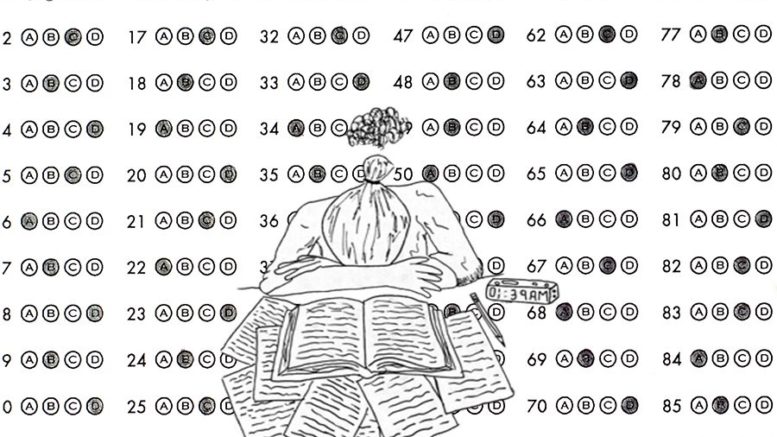
By Ally Wall
Crayons scattered all over desks. Scraps of construction paper on the floor like confetti. Tiny puddles of Elmer’s covering the desks waiting to be peeled off. Artwork of all colors hanging on the walls. Laughter spilling from under the door, creativity running wild—kids being kids.
Now imagine another vision: tests and homework scattered over desks. Empty walls. Crying from students and shouting from teachers came from under the door, creativity caged, fun shoved on the back-burner—kids turned into testing robots.
Those two scenarios could have been viewed through the same small rectangular window of too many classrooms within just a few years. “The kids became numbers” and “I hate my job” were phrases I heard every day in my childhood home.
“So and So’s parents yelled at me today.”
“This kid cussed me and another student out today.”
“I don’t know how to get them to understand.”
“This kid won’t ever be higher than a two.”
“These kids are my fives.”
“Be quiet and pay attention.”
“We don’t have time for this.”
“This isn’t the job I loved.”
I remember her leaving every evening to take night classes with two young children at home. I remember the long drive to her graduation, listening to the salutatorian speech I was too little to comprehend. I remember her first classroom and the way she would dance around the room with excitement for the upcoming 2006 school year. I remember when it all changed.
LeeAnne Wall, my mother, was a second and third grade teacher in Clay County, FL. She started as a reading aid and was encouraged to return to school to become a teacher.
“I loved working with lower performing students and watching them overcome their struggles,” said Wall. So many teachers get into the profession not for the pay, but for the kids. Every teacher wants to make a difference or a change. They want to give every child that walks into their room equal opportunity and a safe place to learn.
Teachers with ten plus years are packing up and leaving their once treasured profession.
“Teaching used to be fun. My students loved me and I loved them,” said LeeAnne Wall, “They were my kids.” Students would return year after year to hug the teacher that made them love coming to class every day. “It was my favorite part of starting a new year,” said Wall, “I knew I had made a difference in their lives.”
Testing has been a point of controversy for years. The Washington Post states that this “testing nightmare has stripped students of the opportunity to foster their creativity in every single subject area.” My mom used to ask for my help coming up with all of the fun activities she would do along with her class. Volcanos, slime, centers, games, arts and crafts, raising quail, and interactive lessons. Within the last five years of her career all of those things stopped.
Instead of creativity and excitement flowing from her, the tears and dread of the next day did.
“I used to get sick thinking about going in to work,” said Wall, “My job was terrible.” The county and administration pushed for higher scores and stripped all the fun out of learning. Students were taught how to pass tests that would define them for the rest of their education. Behavior problems skyrocketed. Parents blamed teachers for their child’s behavior or bad grades.
The superintendent would show up to schools unannounced and dig through the desks of students and teachers to see if they were teaching books page by page. If they hadn’t, they would be made examples of “what not to be.” Principles would be fired with no explanation. Paranoia mentally destroyed some of the county’s best employees.
When my mom would walk the miserable halls, teachers would share looks that said “I hate it here. Help me.” Teacher’s pay and pay raises are based on the performance of their students on standardized tests. The higher the scores, the higher the bonus. Teachers are staying at their jobs because they can’t afford the time off to find a new one. The school system is broken. Teachers should not be sitting in the break rooms complaining about getting their kids ready for tests. Students should not be faking stomach aches to get out of tests or crying in the classroom because they feel stupid.
“I think tests are important,” said Wall, “But they should be used as a way to help the student, not give them anxiety or tear them apart when they don’t get the score they desire.” Students thrive when they feel that they are doing good. My mom took some of the most difficult students and made them believe that they were worth something. She cried tears of joy when students that she watched struggle the entire year passed these high-stake tests.
I’ve seen the drastic change in all those in the profession around me. They’re all stuck. They deserve more. Teachers are guiding the future of the world. Shouldn’t they be treated as such? Shouldn’t they be paid as such? Shouldn’t they be respected by parents and their employers as such? Teachers are some of the most important people that we have in society.
I can think back through my early education and remember the teachers who had an impact on the person I am today. I can think back and remember how nervous I was to take standardized tests. I’m sure you can to. My early education was still during the time that fun and creativity were allowed out of their box. At this rate, I’m scared to see the tests that are around when I have children. High-risk testing is not something beneficial to the education system.
School should be a place where eight year olds are no longer on anxiety medication. It should be a place that they enjoy—to nurture the minds of the future.



Be the first to comment on "Kids as Numbers: The Broken Education System"